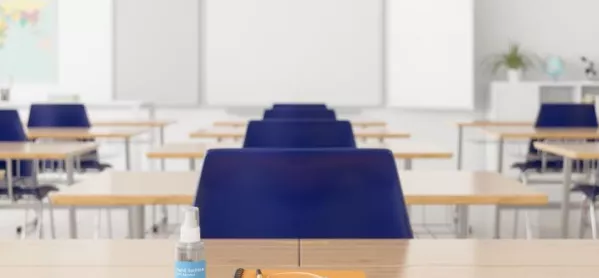Covid: ‘Very sharp’ rise in teacher and pupil absence

Pupil absence due to Covid has increased by 62 per cent in two weeks, with teacher absence also seeing a substantial rise, new government data shows.
Today’s Department for Education data shows how school disruption has risen “very sharply” since half term due to Covid, a heads’ union says.
On 25 November, 212,160 pupils were absent for Covid-related reasons - up from 130,560 on 11 November, the government figures show.
Omicron: Masks back in communal areas to combat Omicron variant
Christmas: Stage ‘important’ live nativity shows, schools told
Absence: More than 200,000 pupils off because of Covid
This amounts to 2.6 per cent of pupils, up from 1.6 per cent two weeks previously.
The majority of pupils who were absent from school either had Covid or a suspected case of the virus.
Teacher and leader absence in state-funded schools related to Covid also increased to 2 per cent, up from 1.4 per cent on 11 November.
From today, masks have been reintroduced in communal areas for pupils in secondary schools and staff in all schools, after the Omicron variant was found in the UK.
Overall attendance in state-funded primary schools on 30 November was 91.1 per cent on 25 Nov, down from 93.6 per cent on 11 November.
For secondary schools, attendance was 87.5 per cent on 25 November, down from 89.5 per cent on 11 November.
School closures
Earlier this month, Covid absences were down after a “circuit breaker” half term.
However, there are now increased signs of Covid-19 disruption growing in schools across the country, with some having to move to online learning due to high staff absence.
The government reported today that 1,000 pupils were absent on 25 November as a result of school closures for Covid-related reasons - up from “fewer than 500” two weeks ago.
Last week, Darwen Aldridge Enterprise Studio in Lancashire, moved to online learning after nine of its 18 teaching staff tested positive for Covid, with the school planning to reopen on 2 December.
In Oxfordshire, four schools have had to switch to remote learning this week for entire year groups or classes, according to the local authority’s website.
Testbourne Community School in Hampshire has had to close its doors to all Year 8 students today due to a “severe staff shortage”.
Omicron warning
Commenting on the latest school attendance statistics published today, Geoff Barton, general secretary of the Association of School and College Leaders, said: “It is clear from these figures that the reduction in Covid-related pupil and staff absence after half term has been short-lived and that this disruption has risen very sharply once again.
“Schools are also having to cope with an increased rate of staff absence which makes the demands of delivering simultaneous in-class and remote education to different groups of pupils even more challenging.
“The emergence of the Omicron variant seems likely to make this situation worse.”
‘Short lived’ reprieve
The NAHT school leaders’ union has called the reprieve in absences after half-term “short-lived.”
Paul Whiteman, general secretary, said: “The number of pupils absent due to Covid dropped after half term but, as today’s figures show, that reprieve was short-lived. There has been a marked increase in Covid related absence once again.
“In addition to the existing disruption, there is now also significant concern about the impact the new variant of Covid could have on schools.
“School leaders can’t help but remember winter term 2020 and just how bad things got. The government was too slow to act last year - it cannot repeat those same mistakes this year.”
The DfE has been contacted for comment.
Register with Tes and you can read two free articles every month plus you'll have access to our range of award-winning newsletters.
Keep reading with our special offer!
You’ve reached your limit of free articles this month.
- Unlimited access to all Tes magazine content
- Save your favourite articles and gift them to your colleagues
- Exclusive subscriber-only stories
- Over 200,000 archived articles
- Unlimited access to all Tes magazine content
- Save your favourite articles and gift them to your colleagues
- Exclusive subscriber-only stories
- Over 200,000 archived articles
topics in this article



